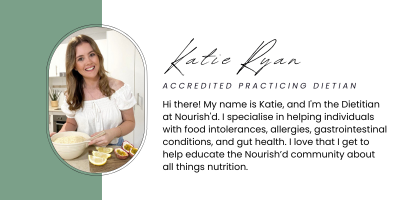Before joining the Nourish’d team, I spent years in private practice—just me, a comfy clinic room, and hundreds of incredible women walking through my door. One of the most common sentences I heard?
“Katie, I haven’t changed a thing… but the weight just won’t budge.”
These women were in their 40s and 50s—go-getters, mums, professionals, caretakers, all of them smart, capable, and increasingly frustrated. The scale seemed to be moving against them, no matter how "healthy" they thought they were eating.
What was happening? In nearly every case: perimenopause or menopause.
The Hormonal Shift That No One Warns You About
During this life stage, estrogen starts to fluctuate, impacting everything from metabolism and fat distribution to mood and sleep. The body becomes more insulin resistant, muscle mass naturally declines, and cardiovascular risk creeps up.
And yet, no one had given these women a roadmap for what to do nutritionally. That became my mission.
Here's What I Always Told Them:
1. Healthy Fats Are Your Friend (In the Right Amounts)
I used to see women avoid fat entirely, thinking it was the enemy. But for heart health and blood sugar balance, small portions of healthy fats daily are crucial.
✅ A handful of almonds or walnuts
✅ A drizzle of extra virgin olive oil
✅ Oily fish like salmon a couple times a week
✅ Chia or flaxseeds in your smoothie
These fats can help manage cholesterol levels, reduce inflammation, and support hormone production.
2. Say Goodbye to Saturated Fat (Mostly)
I recommended keeping saturated fat under 10% of daily intake. That means limiting processed meats, full-fat dairy, and fried foods to help protect heart health—a growing concern during and after menopause.
3. Creatine – Not Just for the Gym Bros
One supplement I always recommended: Creatine (5g/day).
Why? Because it helps with:
- Bone mineral density
- Muscle retention
- Cognitive function
- Sleep and mood regulation
Many of my clients were surprised by this—it's not just for athletes. It’s a quiet powerhouse, especially for women navigating hormonal changes.
4. Veggies Are Your Daily Armour
Non-negotiable: 5 serves of vegetables a day.
They deliver essential nutrients, fibre for gut health, and antioxidants to combat inflammation.
Pro tip: Add them to every meal. Your plate should look like a rainbow.
5. Reduce Calories, But Gently
For those struggling with weight gain, I’d suggest reducing energy intake by 500–700 calories a day from their current diet. No crash diets—just mindful portions, nutrient-dense meals, and consistency.
6. Low GI Carbs – Yes, You Still Need Them
Carbs aren’t the enemy. The trick is timing and type. I’d guide women to choose low GI, high-fibre carbs like sweet potato, oats, legumes, and quinoa, and spread them across the day to prevent sugar spikes and crashes.
7. Protein is the New Queen
After 40, we start to lose muscle mass—unless we actively fight it.
I always pushed for at least 25g of protein per meal to help preserve lean muscle, which also boosts metabolism and helps with satiety.
8. Calcium + Vitamin D = Bone Protection
These two nutrients become non-negotiable. I encouraged food-first approaches:
- Dairy or fortified plant milks
- Tofu, leafy greens, sardines
- Sun exposure (when safe)
They’re key to maintaining bone mineral density, which rapidly declines in postmenopausal years.
Final Thoughts: You’re Not Broken—Your Body is Evolving
I told every woman who sat across from me:
“You’re not failing. Your body is simply asking for a new kind of support.”
Perimenopause and menopause are not a time to give up on health goals—they’re a time to double down with smarter, more targeted strategies. That’s exactly why we craft our Nourish’d meals with these considerations in mind: balanced macros, hormone-supportive ingredients, and nutrition that fuels you through every life stage.
With the right food, knowledge, and self-compassion, this can be a time of strength—not struggle.
Want meals tailored for where you’re at in life? Explore our menu—you’ll find support on every plate 💚
Please note: this is general advice only. For personalised support, always speak with an Accredited Practising Dietitian or your GP.



.png)